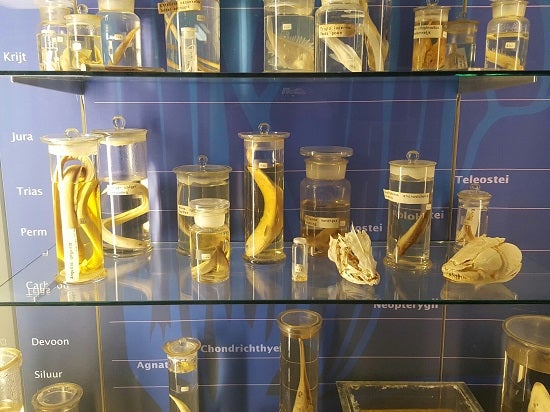Where does this story come from?
Vrije Universiteit Library – this story was told to us by Liselotte Neervoort, curator Academic Heritage.
Forgotten specimens
I stumbled upon many forgotten specimens: ill-prepared, broken, without metadata. Sometimes just a single sample, sometimes whole boxes full which once long ago belonged to a no longer existing research group. A true horror for a curator. I will share some of the worst examples.
Unopened cardboard box from Australia
A cardboard box still taped shut, filled with, according to the shipping label, geological specimens from Australia. It arrived more than ten years ago, but probably after the researcher to whom it is addressed left his or her position at VU Amsterdam. Forgotten and unopened, it now resides in a room in the back of the basement.
Unreadable labels
A collection of “wet specimen”, glass containers filled with a wide variety of marine samples. Once upon a time, they all had labels, but the ethanol solution the samples had been preserved in, has rendered most of the ink unreadable. Specimen name, date collected, location, all are lost. Most of the samples were also ill-prepared, or at least not prepared to last forty or fifty years, their current age. The alcohol has vaporized; opening the display case in which they are stored will give you a mighty headache from the fumes.
Terrible smell
And perhaps the most disgusting one: ten or twenty study skins of birds, badly prepared, smelling terrible, stuck together, left in a metal cabinet. They did once have labels, in this case, but if your material is falling apart (literally), it still isn’t re-useable. These were only fit for the garbage bin.
Lessons learnt
The lessons learnt for physical data are in many aspects the same as for digital data:
- Make sure people know the samples are there and that someone is responsible for it. So: register them in a catalogue and provide good metadata.
- Make sure the metadata are and will remain findable and readable, and that they are regularly backed up somewhere.
- Make sure the samples are well preserved, for the long run, and maintain them once in a while.
The stories for the Data Horror Week 2020 were collected by the Research Data Management (RDM) Support Desk at Vrije Universiteit Amsterdam.
